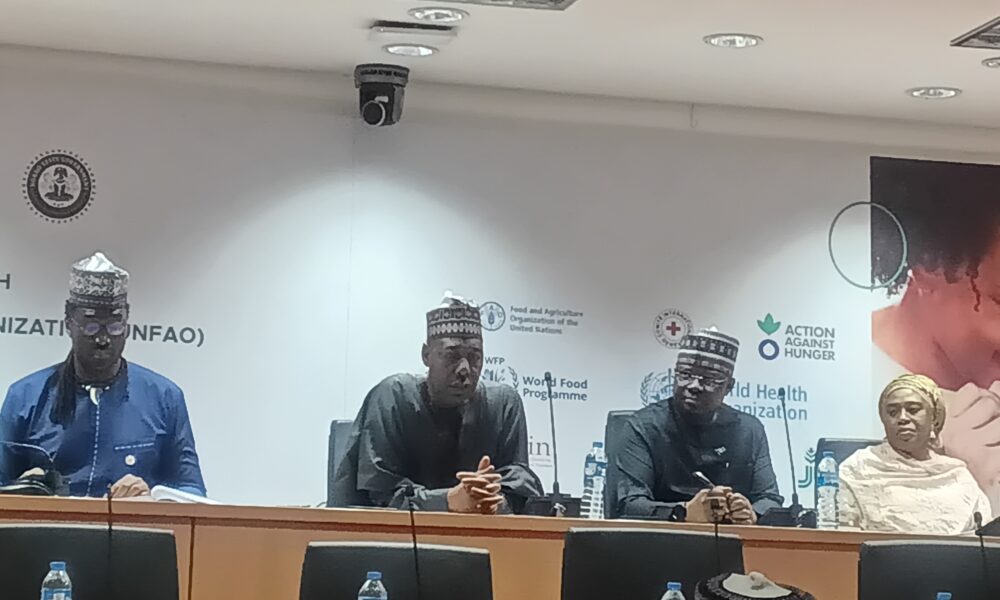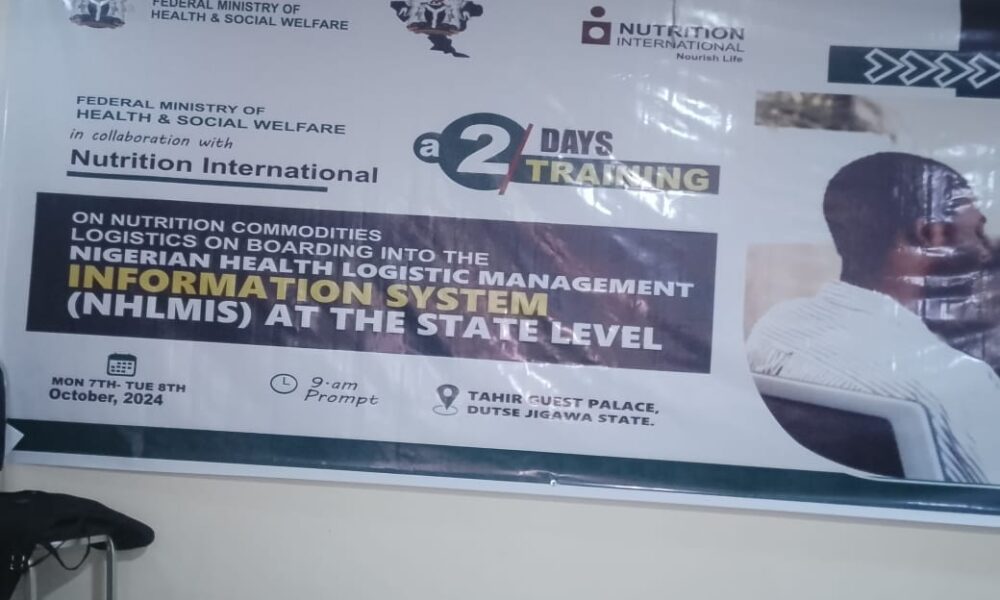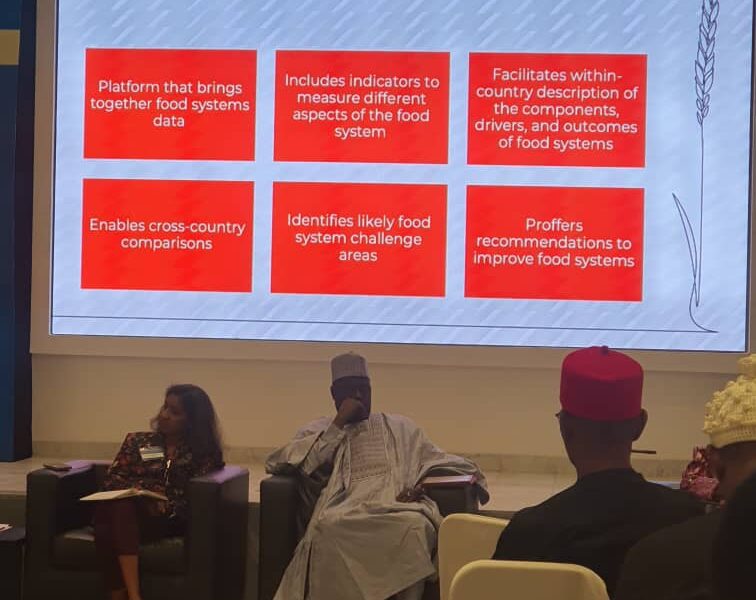***How a Simple Local Recipe is Becoming Nigeria’s Answer to Malnutrition
***200 Children Die Daily as Northeast Nigeria Battles Wasting, Stunting – Expert
Borno State Governor, Babagana Zulum has reaffirmed his commitment to tackling malnutrition through the large-scale production and distribution of Tom Brown, a locally sourced, nutrient-dense food supplement.

Speaking at a roundtable discussion on scaling up Tom Brown in Borno State, held at the United Nations House in Abuja, Governor Zulum highlighted the urgent need for sustainable solutions to malnutrition, particularly in the insurgency-ravaged northeast. The event was organized by Borno’s Ministry of Health in collaboration with the United Nations Food and Agriculture Organization (FAO).
“Our approach goes beyond treatment; we aim to prevent malnutrition by harnessing our local resources. We have the potential, but we need to fully utilize it. This project is about maximizing our natural and human resources to produce a locally made supplement that can significantly reduce malnutrition,” Zulum stated.
While Tom Brown has long been a staple in many Nigerian households, Zulum’s administration is working to standardize and scale up its production to ensure it meets the highest nutritional standards.
“We are investing in research and production enhancements to make Tom Brown widely available through our health and nutrition programs,” he added.
The state government’s plan focuses on, increasing production to make Tom Brown more widely accessible, integrating it into state nutrition programs for sustainability, Partnering with researchers and health experts to enhance its formulation and distributing it through primary healthcare centers across the state.
Borno’s leadership in this initiative is setting a precedent for other states facing similar malnutrition challenges.
“We are investing in a sustainable solution that not only nourishes our children but also empowers local communities through production and distribution,” Zulum emphasized.
At the event, Borno State Commissioner for Health and Human Services, Professor Baba Malam Gana, called for urgent action to expand Tom Brown production as a national response to Nigeria’s malnutrition crisis.
Addressing international partners, policymakers, and private-sector stakeholders, he warned of alarming projections, stating that by 2025, 2.5 million Nigerian children under five will suffer from acute malnutrition.
Explaining further he said over 1 million cases will be classified as severe, while more than 300,000 pregnant and breastfeeding women will be affected.
“Tom Brown has the potential to reduce malnutrition relapse by up to 35%, making it a cost-effective and sustainable alternative to imported supplements,” Professor Gana stated.
He listed key Objectives of the Roundtable discussion to include, mobilizing donor support for large-scale production,, strengthening public-private partnerships for sustainability and aligning with global health goals, particularly SDG 2 (Zero Hunger) and SDG 3 (Good Health and Well-being).
Professor Gana commended international organizations, including FAO, UNICEF, WHO, and the World Food Programme (WFP), for their support. He urged stakeholders to prioritize local nutrition solutions, stressing that investing in Tom Brown would save lives, create jobs, and build community resilience.
“Together, we can make malnutrition a thing of the past,” he concluded.
Dominique Koffy Kouacou, the FAO Country Representative to Nigeria, praised Governor Zulum’s leadership and urged stakeholders to scale up Tom Brown production and distribution nationwide.
“We are not here to talk about problems—we are here to talk about solutions,” Kouacou declared.
He emphasized that expanding Tom Brown production would not only combat malnutrition but also create jobs and empower local producers. Already, the initiative has created over 70 jobs through women-led initiatives.
“Scaling up Tom Brown is not just about fighting malnutrition; it’s about empowering communities, creating jobs, and fostering resilience,” he stressed.
With support from the EU, UNICEF, and key embassies, the initiative aims to build upon its initial success and expand nationwide.
“Nigeria has the solutions within its borders. Now, it’s time to go big,” Kouacou added.
Despite over $1 billion in humanitarian aid directed toward nutrition programs, malnutrition rates in Northeast Nigeria remain alarmingly high.
John Mukisa, Senior Nutrition Coordinator for Northeast Nigeria, revealed that at least 200 children die daily from severe malnutrition-related causes adding that 3.5 million children in the region are affected by malnutrition with Central and Northern Borno, Northern Yobe, and parts of Adamawa as the worst hit
“Without urgent intervention, millions more remain at risk of wasting, stunting, and anemia, conditions that threaten both lives and the region’s economic stability,” Mukisa warned.
He also highlighted Nigeria’s hidden costs of malnutrition to invlude loses of $500 million in GDP annually due to malnutrition, severe stunting and wasting that threaten economic stability and the misuse of humanitarian aid as a major challenge.
Mukisa called on state governments, regulatory agencies like NAFDAC, and law enforcement to prevent the diversion of humanitarian aid and ensure nutrition supplies reach vulnerable children.
The Federal Ministry of Health and Social Welfare has announced plans to standardize the production of locally made, nutrient-dense food as part of its broader strategy to combat malnutrition.
A representative of Health Minister Prof. Muhammad Ali Pate emphasized the urgency of addressing Nigeria’s “triple burden of malnutrition”—underweight, overweight, and micronutrient deficiencies. The latest National Demographic and Health Survey (NDHS) 2023–2024 revealed that 40% of Nigerian children suffer from malnutrition, prompting swift government action.
One of the key measures is the standardization of Tom Brown in partnership with NAFDAC and UNICEF to ensure quality, consistency, and effectiveness nationwide.
“Different communities use different methods, and there is no standardization. Our goal is to develop a national guideline to ensure that every child receiving this food gets the right nutrients,” the Ministry’s representative stated.
The Office of the Vice President is also set to launch “Nutrition 774”, a nationwide initiative that will establish nutrition community centers in all 774 local government areas. These centers will serve as hubs for educating caregivers, traditional leaders, and religious leaders on nutrition, promoting standardized, nutrient-rich foods like Tom Brown.
Special Adviser on Health to President Bola Tinubu, Mrs. Salma Anas, praised Borno State for becoming the first sub-national government in Nigeria to spearhead a comprehensive, homegrown nutrition campaign.
“This is the new Nigeria we want to see—sub-national leadership driving real implementation,” she said.
She emphasized that the initiative aligns with the Presidential Unlocking Value Chain initiative, which prioritizes local food production, job creation, and women’s empowerment.
“This is more than just a nutrition program—it’s an investment in the intelligence and well-being of our children,” she concluded.
With Borno State leading the charge, Nigeria’s fight against malnutrition is taking a bold step forward, proving that homegrown solutions can be the key to lasting change.



